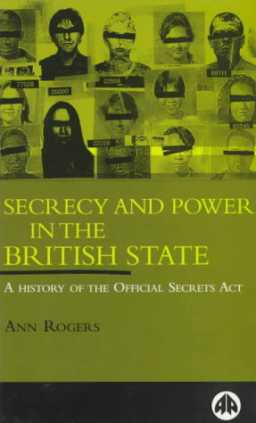Ann Rogers
Pluto Press, 1997
£35.00 h.b. £10.99 p.b
On page 2 the author announces that she is going to use a ‘Foucauldian approach’. To wit:
‘It focuses on the effects of power rather than its mechanism; that is, it attempts to analyse visible manifestations of power as outputs rather than intentions. Foucault argues that an effective analysis of the use of power “should refrain from posing the labyrinthine and unanswerable question who then has power and what has he in mind?” Instead, it is a case of studying power at the point where its intention, if it has one, is completely investigated in its real and effective practice.’ ‘Such an approach,’ she continues, ‘allows us to step out of the constraints imposed by the liberal orthodoxy entrenched in existing literature about the role of secrecy in the British legal-rational state.’
This approach produces sections like this on pp. 8-9:
‘The interplay between policy-making, political power and its expression in the different institutional frameworks of the British state — the Cabinet, Whitehall, the security and intelligence services and so on — gives rise to national security policies that exhibit identifiable characteristics based on social class and political beliefs …..British policy-makers have entrenched a class-divided and politically biased mode of rule which produces policies that fail both to represent the British polity as a whole and to provide a genuine ‘national security’ designed to protect the rights and interests of all citizens….national security policy is formulated within a politically biased milieu in which national security, loyalty and threat are defined according to the ideological biases of a privileged group rather than according to more neutral or objective assessments.’
Well, yes, of course; but, pace Foucault, the most lumpen version of Marxism, gets you to the same place, doesn’t it? I’m not convinced that Rogers has done anything that new here, but she has written a brisk, mostly readable account of the use of the Official Secrets Act by the British state from a radical perspective, which shows how the central concepts such as ‘national security’ have been used to meet a variety of perceived threats. En route she discusses intelligently, if not originally, the major encounters between the secret state and its opponents and/or victims. Because there is so much information in this period, inevitably the most interesting and most detailed section is on the Thatcher years. There are no great revelations here, but there are some incidents I had forgotten about (and some I’d never heard of); and since I can’t think of another single volume on the OSA in print, let alone from a radical perspective, this is a welcome little (120 pages of text) volume.
But something about her writing bugged me. These are her concluding remarks.
‘Secrecy ….is something inherent in the prevailing political culture…. political power flows through complex webs of relationships which alter the intentions and consequences that the state’s legal-rational precepts attempt to inscribe. The outputs that emerge are not always those envisaged by policy-makers. This is not necessarily a conspiracy agenda or intention behind the uses and abuses of political power. Nor are they the inevitable outcome of Britain’s particular constitutional arrangements. Thus the secret state will not “wither away” with the wave of a constitutional magic wand. The flow of political power is messy both in theory and practice and the task of explaining and reforming the workings of the secret state remains problematic.’
Let’s see if I’ve got this straight:
- Secrecy is inherent in the prevailing political culture. Yes.
- Policy-makers, wielders of political power don’t always get the outcomes they intend.
- Sometimes this is the result of conspiracy. Yes.
- The ‘outputs’ — horrible word — of the use of secret political power are not the inevitable result of the British ‘constitutional arrangements’. Yes.
- So changing those arrangements won’t in itself remove the secret state. Yes.
It is intelligible: it just doesn’t feel intelligible at first reading.
